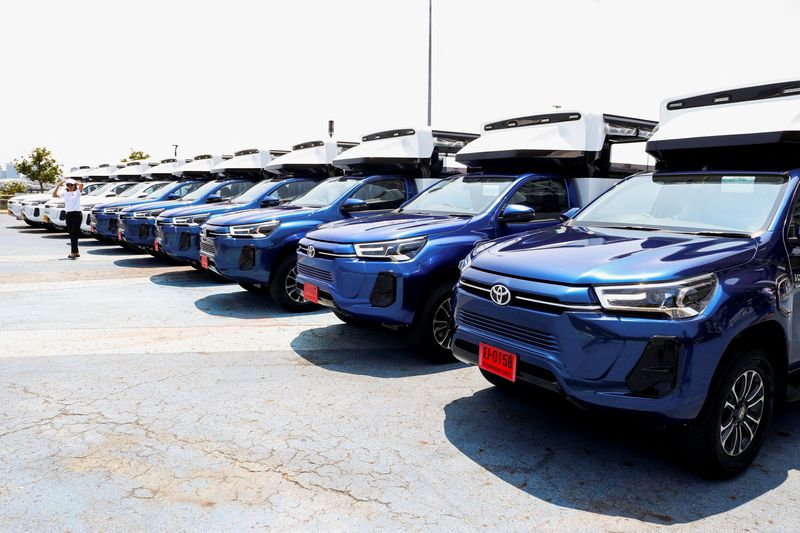By Chayut Setboonsarng and Thanadech Staporncharnchai
BANGKOK (Reuters) - Thailand's $53 billion automobile industry is facing a grim future as highly indebted domestic consumers struggle to finance purchases and overseas buyers of its mainstay traditional vehicles increasingly switch to electric alternatives.
The crisis in Southeast Asia's largest car production hub has forced cuts to output and jobs, and sparked measures from the government to try and reverse its fortunes.
It is already rippling through companies such as Techno-Metal which has been manufacturing cast iron undercarriage parts for Japanese car makers including Toyota Motor (NYSE:TM) and Mitsubishi Motors (OTC:MMTOF) for more than three decades.
Production at the company's two factories in Thailand's Chon Buri province is currently only 40% of peak capacity, and its workforce has steadily declined as orders have eroded, said Deputy General Manager Nattaporn Chewapornpimon. "At the end of last year, there were about 1,200 workers. Now, there are 900 left," she said. "We've also reduced working hours to 75% and cut overtime."
Production in Thailand's automobile industry has been on a downward trend for the last year, sliding 20.6% in August on a yearly basis. And domestic sales fell to their lowest in 14 years on a 12-month moving average basis, industry data showed.
The auto industry is forecasting Thailand to produce 1.7 million vehicles this year, down from 1.9 million in 2023. Of that, 550,000 vehicles are expected to be sold domestically and 1.15 million exported.
"It's a crisis, quite a serious one, with no easy way out," said Hajime Yamamoto, a principal at Nomura Research Institute's consulting division in Thailand, adding that the stagnant home market, combined with increased competition in exports is squeezing the auto sector.
The fast-growing electric vehicles (EV) sector, which has drawn investments of over $1.44 billion from Chinese EV makers such as BYD (SZ:002594), is unable to pick up the slack in output for the local auto parts industry which has about 2,000 companies and employs about 700,000 workers. "The Thai cost structure is 30% higher than the Chinese," said Sompol Tanadumrongsak, President of the Thai Auto-Parts Manufacturers Association.
"Thai businesses can't really do it."
TROUBLE WITH TRUCKS
At the heart of the troubles for the Thai auto sector is the pick-up truck segment, which contributed nearly half of all Thailand's vehicle sales last year, and is a fixture on its roads, from the jam-packed Bangkok streets to rural trails.
In 2023, more than 820,000 pick-ups were exported, or 67% of total produced, according to official data.
This year so far, pick-up truck exports have dropped 8.76% annually, with production down 20.51% annually to 616,549 units, data shows.
This has hit Thai firms because more than 90% of parts of pick-up trucks are manufactured locally, and the segment alone makes up 70% of the domestic parts market, according to the auto parts association.
Sales of auto parts are seen down nearly 12% this year at 519 billion baht ($15.68 billion), the research unit of Kasikornbank said in a September report.
"If auto parts SMEs close today, they are not coming back," said Sompol of the auto parts association, adding the situation was worse than it was during the Asian financial crisis of the late 1990s and the pandemic at the turn of this decade. "If it's left this way - we'll all die."
The main culprit is household debt of $484 billion, or 90.8% of Thailand's gross domestic product as of March 2024, among the highest ratios in Asia, which has put the brakes on car sales.
In the first six months of 2024, financial institutions approved about 203,000 pick-up loans, compared to 722,000 for all of 2019, credit bureau data showed.
The credit situation is so tight across multiple consumer segments that Thailand's main EV manufacturers' association has halved its sales forecast for 2024.
Existing car owners are also struggling to pay back their loans.
"Pickup truck NPLs started to show in the first quarter of 2022," said Surapol Opastien, head of the National Credit Bureau, referring to non-performing loans that have since surged 40% year-on-year to 148 billion baht ($4.46 billion).
INCENTIVES PLANNED
Industry groups are now scrambling to find solutions, with the auto parts sector pushing the government for more incentives to foreign manufacturers of traditional internal combustion engine (ICE) and hybrid cars.
"We want to be the last man standing in ICE, especially in pick-up trucks, and hybrid production ... draw auto makers to move that production here," said Sompol of the parts group.
The government plans to offer investment incentives and subsidies for hybrid manufacturing.
"The Japanese have also adapted to hybrid technology to compete and still need parts," said Surapong Paisitpattanapong, of the Federation of Thai Industry's automotive division.
Thailand's Board of Investment is also trying to entice foreign investors to form joint ventures with local auto part companies.
"This will change Chinese EVs into Thai EVs, which can then be exported," said EV association head Suroj Sangsnit, pointing to tariffs on China-made cars from the United States, EU and India.
"There is nothing other than this that can improve the situation."
But for some Thai firms, working with Chinese EV makers has been a challenge, including because of pricing differences.
"Even if we can (supply Chinese EVs), the profits are low," said Techno-Metal's Nattaporn.

"We still have to focus on OEM (original equipment manufacturing) for Japanese brands. If they have EV plans, that would be a blessing for us."
($1 = 33.1100 baht)